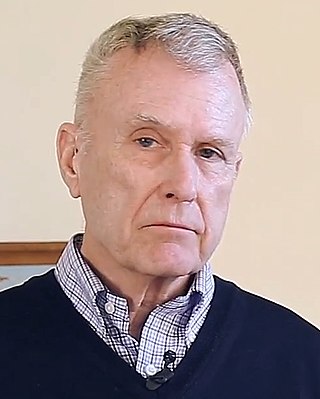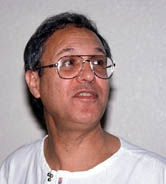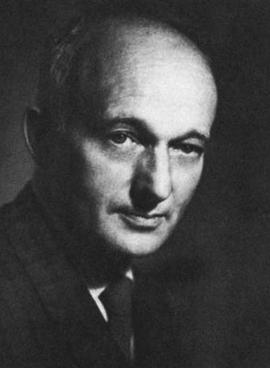Related Research Articles
Robert Bolesław Zajonc was a Polish-born American social psychologist who is known for his decades of work on a wide range of social and cognitive processes. One of his most important contributions to social psychology is the mere-exposure effect. Zajonc also conducted research in the areas of social facilitation, and theories of emotion, such as the affective neuroscience hypothesis.

Claude Mason Steele is a social psychologist and emeritus professor at Stanford University, where he is the I. James Quillen Endowed Dean, Emeritus at the Stanford University Graduate School of Education, and Lucie Stern Professor in the Social Sciences, Emeritus.
Lewis R. Goldberg is an American personality psychologist and a professor emeritus at the University of Oregon. He is closely associated with the lexical hypothesis that any culturally important personality characteristic will be represented in the language of that culture. This hypothesis led to a five factor structure of personality trait adjectives. When applied to personality items this structure is also known as the five-factor model (FFM) of personality. He is the creator of the International Personality Item Pool(IPIP), a website that provides public-domain personality measures.

Richard Eugene Nisbett is an American social psychologist and writer. He is the Theodore M. Newcomb Distinguished Professor of social psychology and co-director of the Culture and Cognition program at the University of Michigan at Ann Arbor. Nisbett's research interests are in social cognition, culture, social class, and aging. He received his Ph.D. from Columbia University, where his advisor was Stanley Schachter, whose other students at that time included Lee Ross and Judith Rodin.

Michael I. Posner is an American psychologist who is a researcher in the field of attention, and the editor of numerous cognitive and neuroscience compilations. He is emeritus professor of psychology at the University of Oregon, and an adjunct professor at the Weill Medical College in New York. A Review of General Psychology survey, published in 2002, ranked Posner as the 56th most cited psychologist of the 20th century.
Daniel Katz was an American psychologist, Emeritus Professor in Psychology at the University of Michigan and an expert on organizational psychology.

Stanley Schachter was an American social psychologist best known for his development of the two factor theory of emotion in 1962 along with Jerome E. Singer. In his theory he states that emotions have two ingredients: physiological arousal and a cognitive label. A person's experience of an emotion stems from the mental awareness of the body's physical arousal and the explanation one attaches to this arousal. Schachter also studied and published many works on the subjects of obesity, group dynamics, birth order and smoking. A Review of General Psychology survey, published in 2002, ranked Schachter as the seventh most cited psychologist of the 20th century.

Shalom H. Schwartz is a social psychologist, cross-cultural researcher and creator of the Theory of Basic Human Values. He also contributed to the formulation of the values scale in the context of social learning theory and social cognitive theory.
Eleanor Emmons Maccoby was an American psychologist who was most recognized for her research and scholarly contributions to the fields of gender studies and developmental psychology. Throughout her career she studied sex differences, gender development, gender differentiation, parent-child relations, child development, and social development from the child perspective.
John Robert Putnam French Jr. was an American psychologist who served as professor emeritus at the University of Michigan. He may be best known for his collaboration with Bertram Raven on French and Raven's five bases of power in 1959.
Robert E. Lane was an American political scientist and political psychologist. He was the Eugene Meyer Professor Emeritus of Political Science at Yale University. Lane taught there for nearly 50 years; during that time, he twice headed the department and helped lead the shift towards behavioralism.

Theodore Mead Newcomb was an American social psychologist, professor and author. Newcomb led the Bennington College Study, which looked at the influence of the college experience on social and political beliefs. He was also the first to document the effects of proximity on acquaintance and attraction. Newcomb founded and directed the doctoral program in social psychology at the University of Michigan. A Review of General Psychology survey, published in 2002, ranked Newcomb as the 57th most cited psychologist of the 20th century.
Arnold J. Sameroff is an American developmental psychologist. He researches and writes about developmental theory and the factors that contribute to mental health and psychopathology, especially related to risk and resilience. Together with Michael Chandler he is known for developing the transactional model of development. He is one of the founders of the field of developmental psychopathology.

Lynn R. Kahle is an American consumer psychologist and Professor Emeritus at the University of Oregon's Lundquist College of Business. From 2018 to 2020 he taught at the Lubin School of Business, Pace University in New York as a visiting scholar and professor.
Yaacov Schul is an Israeli professor of cognitive and social psychology at the Hebrew University of Jerusalem.
Howard Schuman was an American sociologist and professor of sociology at the University of Michigan. He is known for his work on survey research, such as the design of polling questions.
Gary H. McClelland is an American psychologist and professor emeritus of psychology at the University of Colorado at Boulder. His research interests focus on decision making, statistical methodologies, and economic psychology.

Oscar Ybarra is an American psychologist. He is professor of organizational behavior at the University of Illinois, and he is professor emeritus of psychology and management and organizations at the University of Michigan. Ybarra is also Research Director of the adaptive social cognition lab, and at Michigan he was Director of Innovate Blue, an organization focusing on innovation and entrepreneurship education. He has also been a visiting professor at Southwest University in Chongqing, China. His research largely revolves around the impact that social connections and social dynamics have on individuals and groups, particularly how patterns of social interaction influence individual cognition, how social media and social networking sites affect well-being, and how perceptions of trust and threat affect interpersonal and intergroup relations. Ybarra is also the co-founder of cred-ABLE LLC, a company that designs research-based assessments for individuals, teams, and small to mid-size companies.
References
- ↑ "Eugene Burnstein". Research Center for Group Dynamics. Retrieved 2018-03-13.